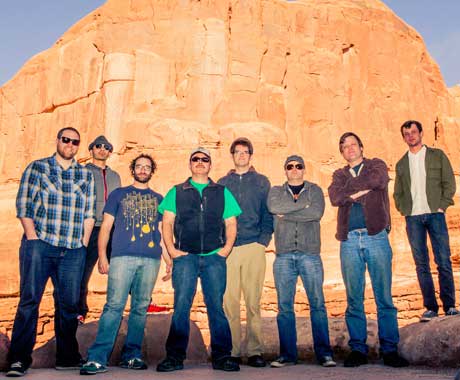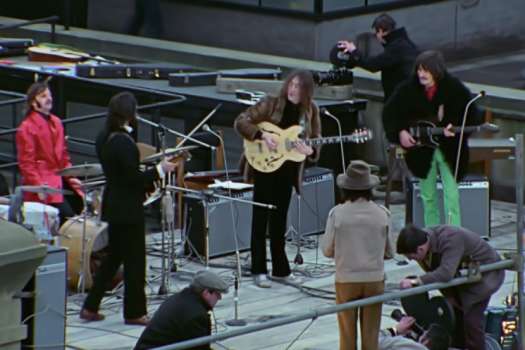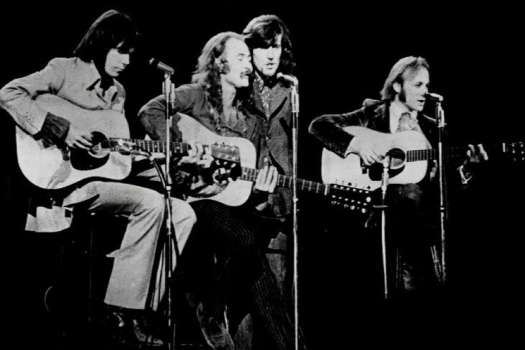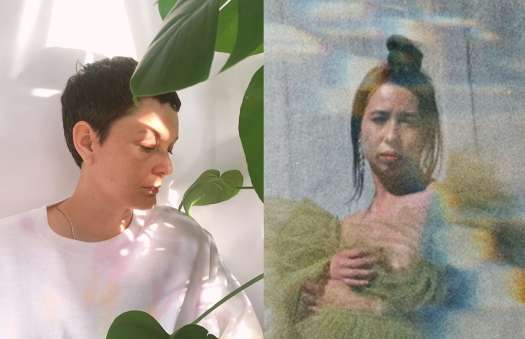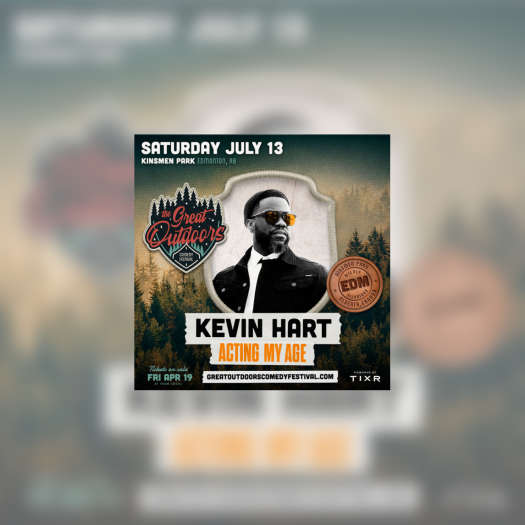The objective is simple: Polyrhythmics want you to dance. Just how they're going about getting your body moving is a little more complex, but eight guys from Seattle have found a way to present new and original Afrobeat and funk compositions that both the masses and purists alike can enjoy. I spoke with founding member Ben Bloom about their latest release, Libra Stripes, how playlist sharing landed them a record deal, and the efficacy of immediately titling your songs.
Polyrhythmics formed in 2010 with yourself and Grant Schroff. How had your experience as musicians lead you down this road?
I had been performing for a number of years in the funk music scene in the Northwest, mostly with an artist named Lucky Brown and a collective of musicians called the Westsound Union, which is sort of a band of Lucky Brown's creation. Grant at the same time had been performing in town in jazz and funk combos. We individually had the concept of putting together a large format dance band playing polyrhythmic Afrobeat funk music. We were coming up with these ideas at the same time. We just connected, had a conversation about it and realized we were both kind of conceptualizing the same type of project and decided to put our heads together, call our friends, players we knew from the scene and try to form a recording project to capture that vibe.
Was this style of music new for some of these members?
In my career I'd touched on a lot of different aspects of funk music and sort of breezed through Afrobeat and polyrhythmic funk world, but never really got to sit on it with the satisfaction that I wanted. Grant had some experience with it as well. Some of the horn players were new to the genre, but most of the musicians were big fans of the genre of Afrobeat, and had influences that spanned the map of polyrhythmic funk music. Everything influences us from Quincy Jones to Miles Davis stuff, but also to more modern groups like the Talking Heads, or jazz fusion concepts that touched on the polyrhythmic thing. We kind of decided to put all those influences together and put it into a dance band format where we're basically focusing on circular and oval-shaped grooves that creates a trance in the listener, in the way that Fela did, but then taking our audience on an adventure with the melodic content of our music.
Circular and oval-shaped grooves? Go on...
If you listen to the bass line in most of our music, there's usually a very cyclical pattern that's occurring, either a call and response within the instrument itself, or a call and response between two different instruments that create a circle. Depending where that occurs, that circle can turn into an oval, where there's a sort of drag and the end of the measure, and a pull back at the beginning. When you do that in a repetitive way, it doesn't seem unnatural. It kind of creates a trance. And then once they're there, then you can deliver any message you want, because you have a captive audience.
Seattle being renowned for its music scene, how much did the city itself lend to incubating the Polyrhythmics sound?
A lot of bands say this market is a very difficult one, partly because there's so much regional talent that it's a little bit hard for outsiders to break in. It's also geographically far, so it's discouraging to drive all this way, and no one comes to your show. It seems like the band we put together came along at the right time, when people are really interested in dancing, getting out and socializing in that way. That outlet was needed, but there weren't other groups in our area that captured what we were doing in a new and innovative way. There's a lot of bands that just play Fela covers, or just straight Afrobeat stuff, or just straight fusion stuff, but nobody was really reinventing the genre, so to speak.
I read you guys have 60 original compositions under your belt. That's almost overwhelming. How did you figure which of those to pull from when putting the album together?
I'm not sure if we've necessarily figured it out. Each recording project has its own life. Our first recording project that brought the band together was an EP. The next record, Labrador, we had other things we had written and were just starting to perform live. So we took all the music we were really tight with and recorded it. For this recording, Libra Stripes, it sort of came after a series of longer tours, and had gotten really comfortable with working out all the things that make a show great. This body of music rose to the top as things we really really like to perform and that really had a response from the audience. We call these tunes "dance floor bangers," the ones that don't let people have anything else to do except get down. There's no choice in the matter.
My understanding is your first EP was a very lo-fi experiment of sorts that was very well received. Sonically this record sounds extremely polished. How is the recording process handled today?
We like to control the recording process. We have a lot of cooks in the kitchen. Recording to tape is something that we really believe in, because it makes us have to perform well. There are no shortcuts, you have to lay it down properly. We chose to work at Olive Studios with an engineer named Mell Dettmer. Mell was Femi Kuti's live engineer for years. She just has an unbelievable musical sense.
Libra Stripes, what's the meaning behind that title?
What does it mean to you? When we come up with a new tune, we have an unspoken rule that we have to name the song right away so that it doesn't carry on as "Idea 1," "Idea 2," "Grant's song," etc. I'll say this, it came off of the experience we had when we were writing the track, writing it at a certain time of year, influenced by individuals who may or may not have been Libras, and who may have been showing their true stripes. But I think it's important to remain a little ambiguous about the titles, because instrumental music does allow you to put meaning to it any way you want to.
The press release accompanying the album firmly states this is funk record, not a throwback, and not retro. Are those some things you guys have been labelled with and are trying to avoid?
Funk music means a lot of different things to different people, and that's okay. Depending on what your references are as a listener or as a club owner/booker/etc., your opinion of a funk record can be completely different. What we were trying to present is a concept of a funk record that doesn't necessarily mean any of those throwback genres. It's taking the spirit of those influences, but creating something new. It is funk music, derived from the same place, and that's to make people dance.
You're releasing this record through a Canadian label, Kept Records. How did that arrangement come about?
Music, especially instrumental music, knows no boundaries. The world of vinyl, people who create vinyl, is kind of a small place. We are record collectors, diggers, and we love find a new 45 or a new record that someone's put out. A lot of ways people like ourselves find these records is through playlists, and tastemakers if you will. Dale [Barrie], the owner of Kept Records, for a lot of years he had put out playlists under the name "citizendale," and we were influenced by a lot of music he put us on to. When we recorded Labrador, we decided that we wanted to find a label that would partner with us in putting out a 45 single. Somehow the internet connected us with Dale. He wanted to start a new label, was really interested in what we were doing, and wanted us to be his first 45 on the label. It was kind of a natural progression. We shopped our music around a little bit more and decided we liked our relationship with Dale and liked where this was going. We're making music happen for the world together. It's sort of a beautiful thing.
You're about to embark on West Coast tour. What has the touring experience been like so far?
We're a recording project and our goal and purpose for being a band is to record music, but the live shows have taken such a life of their own. It's been financially difficult at times because we are an eight-piece band, so travelling and getting the dollar amounts that make it feasible to do this on a regular basis is challenging, but those obstacles are getting easier. So we're excited about playing new places.
Polyrhythmics formed in 2010 with yourself and Grant Schroff. How had your experience as musicians lead you down this road?
I had been performing for a number of years in the funk music scene in the Northwest, mostly with an artist named Lucky Brown and a collective of musicians called the Westsound Union, which is sort of a band of Lucky Brown's creation. Grant at the same time had been performing in town in jazz and funk combos. We individually had the concept of putting together a large format dance band playing polyrhythmic Afrobeat funk music. We were coming up with these ideas at the same time. We just connected, had a conversation about it and realized we were both kind of conceptualizing the same type of project and decided to put our heads together, call our friends, players we knew from the scene and try to form a recording project to capture that vibe.
Was this style of music new for some of these members?
In my career I'd touched on a lot of different aspects of funk music and sort of breezed through Afrobeat and polyrhythmic funk world, but never really got to sit on it with the satisfaction that I wanted. Grant had some experience with it as well. Some of the horn players were new to the genre, but most of the musicians were big fans of the genre of Afrobeat, and had influences that spanned the map of polyrhythmic funk music. Everything influences us from Quincy Jones to Miles Davis stuff, but also to more modern groups like the Talking Heads, or jazz fusion concepts that touched on the polyrhythmic thing. We kind of decided to put all those influences together and put it into a dance band format where we're basically focusing on circular and oval-shaped grooves that creates a trance in the listener, in the way that Fela did, but then taking our audience on an adventure with the melodic content of our music.
Circular and oval-shaped grooves? Go on...
If you listen to the bass line in most of our music, there's usually a very cyclical pattern that's occurring, either a call and response within the instrument itself, or a call and response between two different instruments that create a circle. Depending where that occurs, that circle can turn into an oval, where there's a sort of drag and the end of the measure, and a pull back at the beginning. When you do that in a repetitive way, it doesn't seem unnatural. It kind of creates a trance. And then once they're there, then you can deliver any message you want, because you have a captive audience.
Seattle being renowned for its music scene, how much did the city itself lend to incubating the Polyrhythmics sound?
A lot of bands say this market is a very difficult one, partly because there's so much regional talent that it's a little bit hard for outsiders to break in. It's also geographically far, so it's discouraging to drive all this way, and no one comes to your show. It seems like the band we put together came along at the right time, when people are really interested in dancing, getting out and socializing in that way. That outlet was needed, but there weren't other groups in our area that captured what we were doing in a new and innovative way. There's a lot of bands that just play Fela covers, or just straight Afrobeat stuff, or just straight fusion stuff, but nobody was really reinventing the genre, so to speak.
I read you guys have 60 original compositions under your belt. That's almost overwhelming. How did you figure which of those to pull from when putting the album together?
I'm not sure if we've necessarily figured it out. Each recording project has its own life. Our first recording project that brought the band together was an EP. The next record, Labrador, we had other things we had written and were just starting to perform live. So we took all the music we were really tight with and recorded it. For this recording, Libra Stripes, it sort of came after a series of longer tours, and had gotten really comfortable with working out all the things that make a show great. This body of music rose to the top as things we really really like to perform and that really had a response from the audience. We call these tunes "dance floor bangers," the ones that don't let people have anything else to do except get down. There's no choice in the matter.
My understanding is your first EP was a very lo-fi experiment of sorts that was very well received. Sonically this record sounds extremely polished. How is the recording process handled today?
We like to control the recording process. We have a lot of cooks in the kitchen. Recording to tape is something that we really believe in, because it makes us have to perform well. There are no shortcuts, you have to lay it down properly. We chose to work at Olive Studios with an engineer named Mell Dettmer. Mell was Femi Kuti's live engineer for years. She just has an unbelievable musical sense.
Libra Stripes, what's the meaning behind that title?
What does it mean to you? When we come up with a new tune, we have an unspoken rule that we have to name the song right away so that it doesn't carry on as "Idea 1," "Idea 2," "Grant's song," etc. I'll say this, it came off of the experience we had when we were writing the track, writing it at a certain time of year, influenced by individuals who may or may not have been Libras, and who may have been showing their true stripes. But I think it's important to remain a little ambiguous about the titles, because instrumental music does allow you to put meaning to it any way you want to.
The press release accompanying the album firmly states this is funk record, not a throwback, and not retro. Are those some things you guys have been labelled with and are trying to avoid?
Funk music means a lot of different things to different people, and that's okay. Depending on what your references are as a listener or as a club owner/booker/etc., your opinion of a funk record can be completely different. What we were trying to present is a concept of a funk record that doesn't necessarily mean any of those throwback genres. It's taking the spirit of those influences, but creating something new. It is funk music, derived from the same place, and that's to make people dance.
You're releasing this record through a Canadian label, Kept Records. How did that arrangement come about?
Music, especially instrumental music, knows no boundaries. The world of vinyl, people who create vinyl, is kind of a small place. We are record collectors, diggers, and we love find a new 45 or a new record that someone's put out. A lot of ways people like ourselves find these records is through playlists, and tastemakers if you will. Dale [Barrie], the owner of Kept Records, for a lot of years he had put out playlists under the name "citizendale," and we were influenced by a lot of music he put us on to. When we recorded Labrador, we decided that we wanted to find a label that would partner with us in putting out a 45 single. Somehow the internet connected us with Dale. He wanted to start a new label, was really interested in what we were doing, and wanted us to be his first 45 on the label. It was kind of a natural progression. We shopped our music around a little bit more and decided we liked our relationship with Dale and liked where this was going. We're making music happen for the world together. It's sort of a beautiful thing.
You're about to embark on West Coast tour. What has the touring experience been like so far?
We're a recording project and our goal and purpose for being a band is to record music, but the live shows have taken such a life of their own. It's been financially difficult at times because we are an eight-piece band, so travelling and getting the dollar amounts that make it feasible to do this on a regular basis is challenging, but those obstacles are getting easier. So we're excited about playing new places.
